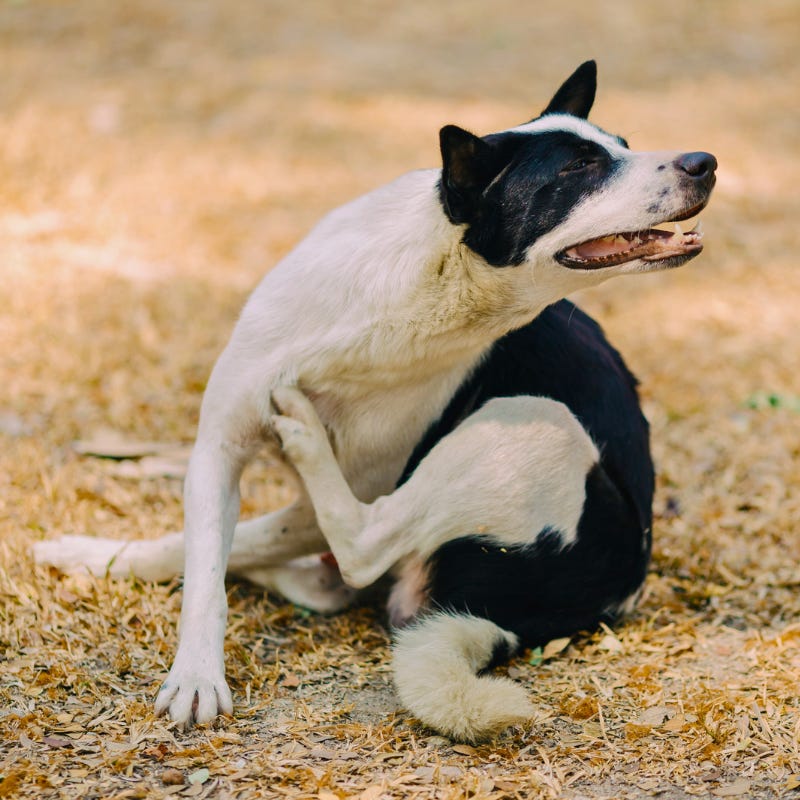Sniffles and Scratches: How Allergy Season Affects Dogs and Treatment Options
As the seasons change and flowers bloom, allergy season arrives not just for us but also for our beloved four-legged companions.
OpenPark is your go-to source for the tools and knowledge to make well-informed choices about your pet's health.
Dogs can experience allergies too, causing discomfort and affecting their overall well-being. In this weeks issue of Parkevity by OpenPark, we will explore how allergy season affects dogs, discuss common signs and symptoms of allergies, and provide helpful tips for noticing and treating allergies in your canine companion.
Understanding Allergies in Dogs
Just like humans, dogs can develop allergies to various environmental factors, including pollen, dust mites, mold spores, and certain foods.
Allergies occur when a dog's immune system overreacts to these substances, triggering an allergic response. Common types of allergies in dogs include:
Environmental Allergies: These are caused by allergens in the environment, such as pollen, grass, weeds, dust mites, or mold.
Food Allergies: Dogs can develop allergies to specific ingredients in their diet, such as certain proteins or grains.
Flea Allergy Dermatitis: Some dogs are hypersensitive to flea saliva, and even a single flea bite can trigger an intense allergic reaction.
Noticing the Signs and Symptoms of Allergies
It's essential to be observant and recognize the signs and symptoms of allergies in your dog. While the specific symptoms may vary, common signs of allergies in dogs include:
Excessive scratching, licking, or chewing of the skin, paws, or ears.
Red, inflamed, or irritated skin.
Hot spots or rashes.
Hair loss or thinning coat.
Chronic ear infections or recurring skin infections.
Sneezing, coughing, or wheezing.
Runny nose or watery eyes.
Digestive issues, such as vomiting or diarrhea.
If you notice any of these signs persisting or worsening, it's crucial to consult with your veterinarian for a proper diagnosis and treatment plan.
OpenPark is dedicated to promoting pet wellness and our community offers proactive care resources to keep our furry friends healthy and happy for life.
Diagnosing Allergies in Dogs
Diagnosing allergies in dogs can be a complex process that involves ruling out other potential causes and identifying the specific allergen. Your veterinarian may perform various diagnostic tests, such as:
Intradermal Skin Testing: Small amounts of common allergens are injected into the skin to observe any reactions.
Blood Testing: Blood samples are taken to check for specific antibodies or allergen sensitivities.
Elimination Diet: A special diet is designed to identify food allergies by gradually reintroducing specific ingredients.
Check out the crowd-verified ParkShop for a curated selection of premium products that help support your pet's longevity.
Treating and Managing Allergies in Dogs
Once your dog is diagnosed with allergies, the goal is to manage their symptoms and improve their quality of life. Treatment options may include:
Avoidance: Limiting exposure to known allergens, such as keeping your dog indoors during high pollen counts or using hypoallergenic bedding.
Medications: Antihistamines, corticosteroids, or other prescription medications can help alleviate itching, inflammation, and other allergy-related symptoms.
Immunotherapy: Allergy shots or oral immunotherapy may be recommended to desensitize your dog's immune system to specific allergens over time.
Dietary Changes: If a food allergy is suspected, switching to a hypoallergenic or limited-ingredient diet may be necessary.
Flea Prevention: Strict flea control measures can help prevent flea allergy dermatitis.
Visit OpenPark.us to learn more about our crowd-verified ParkShop, exclusive Parkners Benefits, and comprehensive Parkevity Resources.
Supporting Your Dog During Allergy Season
In addition to medical treatments, there are several ways you can support your dog during allergy season:
Regular grooming: Frequent brushing and bathing can help remove allergens from your dog's coat and skin.
Clean living environment: Keep your home clean, vacuuming and dusting regularly to reduce indoor allergens like dust mites and mold.
Allergy-friendly products: Opt for hypoallergenic bedding, non-toxic cleaning products, and fragrance-free detergents to minimize irritants.
Paw and body wipes: Wiping your dog's paws and body after outdoor walks can help remove allergens from their fur and reduce skin irritation.
Nutritious diet: Provide a balanced and high-quality diet that supports your dog's immune system and promotes healthy skin.
Regular veterinary check-ups: Schedule routine visits with your veterinarian to monitor your dog's allergies, adjust treatment plans if needed, and address any concerns.
Give your furry family the gift of proactive care with a daily dose of vitality that keeps them moving and grooving as they age throughout their lifetime.
Allergy season can pose challenges for our furry friends, but with knowledge and proactive care, we can help alleviate their discomfort and ensure their well-being.
By recognizing the signs and symptoms of allergies, seeking veterinary guidance, and implementing appropriate treatment strategies, we can manage allergies and improve our dogs' quality of life.
It’s important to create an allergy-friendly environment, minimize exposure to allergens, and support your dog with proper grooming and nutrition.
If you suspect your dog has allergies or if their symptoms persist or worsen, consult with your veterinarian for an accurate diagnosis and personalized treatment plan.
With your dedication and veterinary support, you can help your dog enjoy a happy, itch-free life, even during allergy season.
Remember,
Longevity = Healthy Habits + Time.
Don’t wait!









